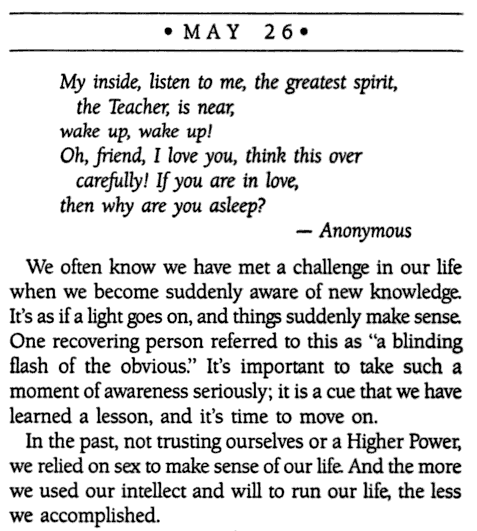In case you are not familiar, the SA White Book describes a variety of different formats of Sexaholics Anonymous on pages 185-189 (Read more). For example, Step Study meetings are a popular choice because the entire program is anchored in the 12 Steps (Read more).
Moreover, the Noon SA Phone meeting was established on 7/13/09 by a guy who believed that in order to stay sober, REQUIRED a lunch SA meeting every day. Since then, there has been enormous growth and maturity developing a “home group” that continues to flourish (Read more). We even setup a Blog specifically for the purpose of honoring our Traditions (Read more – password: noon). In particular, unlike just about every SA teleconference on our schedule we do NOT have a queue of callers. Instead, we are a “volunteer sharing” style which helps accommodate the growing number of callers.
Meetings – How They Work
“As I come into the fellowship, I’m confronted with my disease. First, in my initial contacts with other members; then in meeting after meeting. But there are parts of the disease still hidden in that deep hole inside me, sides of me I never want you to see, and eventually they start festering. So, one by one, I’m forced to get rid of them. The problem is, how do I keep my disease from always running into a dark corner?”
That’s how one member put it in trying to describe something of what happens in meetings. The problem is our blind sides; we all have them. So, the question for us is, How do we work our personal programs and conduct our meetings and fellowship so as to “walk in the light”? Here’s what has been working for us:
1. By getting sober and staying sober and holding to the concept of sexual sobriety in our SA meetings. Without sobriety we have nothing to offer anyone. SA offers sexual sobriety, progressive victory over lust, and recovery. When this is our aim, meetings can become a sanctuary of serenity and light.
2. By not imposing uniformity. We don’t prescribe doing the Steps by formula or in exactly the same way some other member does them. We do the Steps in our own way and time; we “Live and Let Live.” But working the Steps does work for us.
3. By telling the side of our stories we really don’t want to tell. This is different than a mere “sexalog,” relating our sexual experiences. It is rigorous self-searching and self-revealing honesty about every aspect of our lives. We arc fitting the pieces of our lives together differently every time we tell our stories or share.
4. By telling exactly where we are today(where we’re failing today, as well as where we’re succeeding. “I’m as sick as my secrets,” the saying goes. So we reveal our secrets; we bring the inside out. Self-honesty, in humility, yet so powerful. We lead with our weaknesses.
5. By continually working the principles of the Twelve Steps and Twelve Traditions in our lives first, and in our fellowship.
6. By helping others through identification. When we want to communicate to another member, we speak in terms of “I,” not “we” or “you.” We don’t tell them what’s wrong with them or give advice; we relate what happened to us. When we thus identify with another, it may not only help that person, but often reveals something about ourselves we’ve missed before. We don’t tell; we share.
“I can tell you what’s wrong with you without identifying, but this keeps me from looking at myself and can be destructive to you. But when I bring it up by identifying through my own experience, it means I’m bringing myself out into the light.”
7. By taking responsibility for our own recovery. There’s a difference between taking responsibility for our recovery and being in charge of it. When we take responsibility, we’ve stopped saying “Fix me” and are willing to take the actions necessary to get well. We’re
willing to take direction and work the Steps. This same attitude is what leads us to tie in to another sober member as helper or sponsor(one who can help us learn how to work the Steps in our daily lives. When we remain “in charge,” however, we’re shutting ourselves off from the light and help of other recovering members.
8. By leading with our weakness. There is an attractive healing atmosphere in meetings when someone is transparent, naive, “innocent,” and self-revealing at depth. He or she may even be a newcomer, which is often the case and why we need them to help keep us honest. Vulnerable, and like a child, we take the supreme risk of exposing the truth about ourselves, dark as it may be. We lead with our weakness because that’s where we’re hurting, and this becomes the point of our identification with each other, the point of true union. Once this single ray of light shines in a meeting, it finds ready reception and response in the others present. Honesty is catching; we’re learning to walk in the light.
9. By commitment to the group. SA members commit themselves to SA meetings. We attend every meeting we can. On time. Meetings, on time. Why this emphasis?
When the meeting is handled in a haphazard manner, there’s a feeling of What’s the use? There’s the feeling of being let down, that the secretary, leader, or other members don’t care and are not really a part of. And if there’s no feeling of mutual caring, then / can’t be a part of. How can I become a part of something that’s always shifting around? A feeling of separation and isolation comes into play(deadly for us.
Meetings starting on time and a general orderliness are one of the legacies we’ve gotten from the best of other Twelve Step programs. Instead of “doing our own thing,” which characterizes our self-obsession, we commit ourselves to every meeting and to being on time. No matter what(spouses, jobs, money(we put the group first because we put our own sobriety first.
Commitment to sobriety is commitment to the fellowship of sobriety.
Meeting Guidelines
We can benefit from the unwritten guidelines that have contributed so profoundly to the success of other Twelve Step program meetings and have proven as valuable in our own.
1. Leaders of meetings are servants of that meeting. They don’t “carry” the meeting; they merely facilitate it. A common mistake of those who have no prior Twelve Step meeting experience is to feel they must comment on everything that is said or “help out” in some way by giving “the answer.” The effective leader surrenders this impulse and lets the meeting work itself.
2. The leader of the meeting does not have to acknowledge a raised hand; he or she can call on someone else. They can interrupt the one talking, if it is called for. This is in line with our common tradition. At the same time, a good meeting is one where the leader’s presence is inconspicuous and non-controlling.
3. Most groups stick with a certain basic set of readings that are read at every meeting, adding to this to suit the particular meeting. A list of suggested readings from which to draw is included in the Suggested Meeting Format. We use authorized SA and AA literature only, both for use during meetings and for distribution on the literature table.
4. Participation guidelines:
– There is no cross talk. We don’t interrupt others. However, the leader has the right to remind the person sharing of guidelines, time consumed, etc.
– We don’t give advice. We talk in the “I,” not the “we” or the “you,” speaking from our own experience. If we want to respond to what someone has said, we do so only in terms of our own experience. “I can only speak for myself, but whenever I did such and such, this is what happened in my life . . .”
– We don’t get carried away analyzing what caused our behavior or attitudes. If we were victimized
in early life, we slowly learn to face and work through it in acknowledgment, acceptance, and forgiveness. We talk as those who are now responsible for our attitudes and actions and are willing to take responsibility for our lives and recovery.
– In sharing, rather than displaying our knowledge or insights, we lead with our weakness and give of ourselves.
– We avoid politics, religious dogma, and other divisive issues. We also avoid explicit sexual descriptions and sexually abusive language.
– We avoid dumping, self-pity, and blaming others.
– We don’t take the “inventories” of others; that is, we uncover and work on our own defects, not those of others. We refer to our own experiences.
– We do speak honestly of where we really are today. We try to develop transparent honesty of complete self-disclosure, letting the other members know where we are currently, regardless of length of sobriety.
– We do lead with our weakness and take the risk of total self-disclosure.
– By attending on time and sharing regularly, we give of ourselves to others in the group. We get back recovery.
(See the material under the heading “I Am a Sexaholic” under Step One, in this book, and read the article “Meeting Quality and Use of Non-SA Literature,” in Discovering the Principles.)

